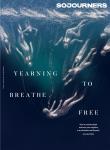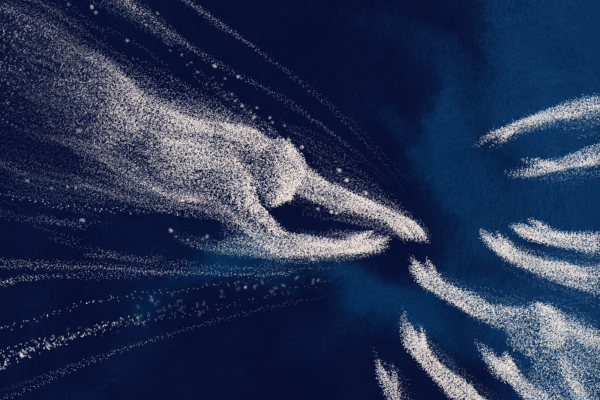WE KNOW WE intertwine with one another and the rest of creation in ways both material and symbolic: through blood and law, employment and play, through the full range of physical contact and social niceties, as well as loan papers, traffic tickets, and contracts. We sing a hymn in church, and the song swells into harmony, a gift of complexity and cooperation.
Through it all we breathe: Breathe in. Breathe out. My breath out mingles with your breath in. A communion of droplets. And so clusters of COVID-19 come not just in places of forced confinement—prisons, nursing homes, meatpacking plants—but after birthday dinners and choral practice, weddings and retirement parties.
“We’re all in this together” you might have heard as stay-at-home orders spread across the country; “the virus is the great equalizer.” After all, what could be more universal than breath? A pauper or a prime minister might breathe in a sufficient viral load to become critically ill.
Labored breathing
BUT THE CONDITIONS in which we breathe, the condition of our breathing bodies, and the conditions of the facilities that treat our bodies when breathing becomes difficult are rarely equal. Some people of great wealth have died from COVID-19, but many, many more of modest or little means have perished from it.
Societal inequalities of income and race incarnate as preexisting medical conditions, including diabetes, asthma, high blood pressure, and kidney and pulmonary disease, that increase the risk of severe illness and death from COVID-19. For example, in Washington, D.C., the bottom 10 percent of income earners have a rate of diabetes nearly 74 percent greater than the median. The wealthy can pay for better food and housing; they have less stress and exposure to industrial pollutants and more access to recreation spaces and health care. The lowest-paying jobs, many of which force people into overexposure to the virus, are disproportionately filled by those with options limited by racial bias and legal status. As Adam Serwer wrote in The Atlantic, “Black and Latino workers are overrepresented among the essential, the unemployed, and the dead.”
And the pandemic did not stop the other ways we deprive people of the breath of life: A neighborhood lynch mob stalks, films, and kills jogger Ahmaud Arbery but is not charged for months; police officers shoot Breonna Taylor in her own home during a botched raid; a white cop kneels on George Floyd’s neck for 8 minutes and 46 seconds.
I breathe out. You breathe in. Before coronavirus, some people did that without a second thought. Yet every day others were struggling to breathe at all.
This both is and is not a metaphor. Breath, in the Jewish and Christian traditions, is literal and figurative, physical and spiritual. In describing Ezekiel’s vision of the valley of dry bones, Hebrew Bible scholar Wil Gafney notes that “these one-time zombies had ruach,” a word that means both spirit and breath. “They had spirit-breath, life-breath, the breath of God poured into them and they returned fully to life, resurrected,” writes Gafney. The lack of breath, in all its dimensions, is deadly. Its free flow is holy.
When people say they can’t breathe—whether from weakened lungs, air pollution, or an illegal chokehold—it is a threat to life. When fish float on a river because the water is deoxygenated, it is a threat to life. When the dangerously overworked experience a “shortness of breath,” it’s a societal alarm, not just an individual condition.
Death-cult math
IN THE MIDST of all this, a kind of “death cult” has emerged, one that evangelizes for death as key to “our” way of life. President Trump first tweeted in March that “the cure”—i.e., shutdowns to help slow the spread of the virus—“can’t be worse than the problem itself,” pitting the economy against human fatalities. Sympathetic pundits and some protesters picked up on the theme.
Perhaps this is a natural outgrowth of the prosperity gospel and other forms of exceptionalism: The wealthy and powerful and those who emulate them consider themselves favored by God. Or maybe it’s the inevitable outcome of actuary tables that calculate the monetary worth of a human life and margins of “acceptable” loss—estimations intrinsic to modern capitalism, with greed and racism usually riding shotgun.
But rhetoric that defines some deaths as “necessary” sinks to a level of cynicism that should be stunning: Texas Lt. Gov. Dan Patrick gained notoriety for saying (and then reconfirming a few weeks later) that senior citizens like him should be willing to sacrifice their lives for the economy. Some added a strange theological and moral assessment: “It’s fascinating to see how the cultural loss of belief in God and eternity so often manifests in an outsized fear of death as the ultimate evil,” tweeted Alexandra DeSanctis, who writes on abortion issues for the conservative National Review. In a since-deleted tweet squall, R.R. Reno, editor of the conservative religious journal First Things, railed against the wearing of masks: “The mask culture [is] fear driven. Masks+cowardice. It’s a regime dominate by fear of infection and fear of causing of infection. Both are species of cowardice.”
According to Far-Right websites, most governments around the world were “hysterical, panicky, and entirely excessive” in their response to the coronavirus, observes Austrian political scientist Natascha Strobl. In fascist ideology, Strobl notes, “weakness [which includes sickness] is never worthy of protection and has to be cast out.” The ideal pandemic strategy, to these Far-Right adherents, would be “to let things go their usual way, both in order not to ruin the economy and because the lockdown is a fearful and thus unmanly strategy,” writes Strobl. “What is demanded from people in the risk group is to not be weak, but strong, which means to die without protest.”
In this assertion of the saving power of (some people’s) death, the oft lauded and frequently virus-exposed “essential” workers—such as health care personnel, farmworkers, grocery store clerks, warehouse staff, meat packers—should keep risking their lives to “save the economy.” And factory workers, retail store clerks, teachers, service workers, and others should join them, even though the virus is nowhere near contained.
The economic situation is dire: One in four American workers lost a job between early March and late May, with 21 million receiving unemployment even as many states began to reopen in late spring. But instead of, say, the government supporting a teetering economy with a temporary “guaranteed wage” policy, many people are encouraged to make a thankless choice between their health and their livelihoods. Several states, including Vermont, Montana, Oklahoma, Tennessee, and South Carolina, are encouraging businesses that reopen to report employees who refuse to return to work, even for health and safety concerns. The state can then stop unemployment payments and save money. CDC and OSHA workplace safety guidelines for reopening are scant, and OSHA has announced that they are “providing enforcement flexibilities,” that is, not really enforcing them at all.
As some are asked to sacrifice all in a time of crisis and economic scarcity, the Institute for Policy Studies reported in early June that U.S. billionaires have become $565 billion richer since March 18. The death cult’s math seems skewed.
“No dominion”
BREATH IS LIFE. When life is valued and someone stops breathing, those who are nearby shift into emergency mode. They try to resuscitate the person who is in danger. In other words, they rebuke death and love their neighbor.
Most Christians believe in the “resurrection of the dead and the life of the world to come” and know that Jesus exhorted us to love, saying, “Greater love has no one than this, that they lay down their life for their friends” (John 15:13). We may find ourselves called to self-sacrifice out of love for another. However, for the wealthy and powerful to deem the deaths of the powerless a noble calling to benefit themselves is not only theologically indefensible, it is blasphemy.
The claim that “death has no dominion” is an invitation to generous love and living, not a brush-off to those who are sick, suffering, fearful, and grieving. We breathe together in ways seen and unseen. And though that makes us vulnerable, it also gives us common life. Without our God-given life-spirit, holy breath filling both our lungs and our souls, we are dry bones or zombies.
As of this writing there have been more than 120,000 U.S. COVID-19 fatalities. U.S. police killed an estimated 1,100 people in 2019, with CNN estimating that in-custody deaths in this country happen at a rate more than double that of Australia and six times the U.K. We, unlike God, can’t resurrect these souls. But we could address the conditions that have caused so much devastation—conditions that have been bearing down on some, stealing their breath, for a lifetime, a generation, centuries.
Hyper-local mutual aid networks—sometimes neighbors helping neighbors, sometimes strangers helping strangers—sprang up in cities across the country as the coronavirus shutdowns began, getting groceries to elders and other extra-vulnerable people, distributing masks, providing transportation and otherwise helping address some gaps caused by the widespread sudden loss of income, child care, and food access. Other such networks formed or expanded almost immediately during the protests in Minneapolis and elsewhere following the killing of George Floyd, distributing groceries, building supplies, diapers, and more after the destruction of grocery stores serving several neighborhoods.
To be clear, we can’t GoFundMe and go-to-Costco-for-others our way into deep structural changes. (Although these are more wholesome approaches than convening, as Gov. Andrew Cuomo has, a panel of billionaires to devise solutions to fix problems that at base are linked in part to the existence of billionaires.)
These practices don’t address the structural issues we face, but they offer us emotional, intellectual, and material rootedness in seeking the good of our neighborhood, town, or city. Just as the right posture helps us breathe better, expanding and deepening our practice of community feeds organizing and advocacy efforts and civic engagement to extend care for our neighbor to a regional, state, and national scale.
Breathing easier
AS THE FEDERAL government fumbled and often abdicated the responsibility to care for its citizens, some governors, mayors, and city and county councils filled gaps, issuing stay-at-home orders, closing businesses, and committing to providing daily briefings with public health and aid information. Local leaders helped halt rent collections, stop utility shutoffs, and secured the early release of some inmates from state prisons and jails. “We’re winning stuff that last week sounded radical,” Kansas tenants-right activist Tara Raghuveer told The New York Times.
Likewise, nationwide protests in response to the killings of George Floyd, Breonna Taylor, and the ever-growing list of victims of U.S. police brutality brought actions thought unimaginable just weeks before: A majority of the Minneapolis city council publicly supported disbanding the city’s current police department. Los Angeles Mayor Eric Garcetti scrapped plans for a large police budget hike and instead pledged to pursue cutting up to $150 million from the police budget.
Even some elected representatives whose economic and governing framework typically holds that “to those whom much has been given, much more should be given” have helped enact emergency aid and compassionate gestures during the pandemic. The long-term project is to challenge our culture and leaders to see this not as temporary “generosity” or charity but as basic humanity that lays out a political and social platform for how we move ahead.
Picture for a moment all those essential workers having a living wage. Think of unemployed people who had sufficient cash and in-kind assistance from their government to keep themselves and their family, housed, clothed, and fed. Imagine universal health care, so that those who had lost or needed to shift jobs would not find themselves without the ability to see a doctor or pay for prescriptions. Why not dismantle the penal-industrial complex that siphons hope, wage-earners, and creative potential from entire neighborhoods, and shift the funding back to education, public health, housing, and the other basics that actually make a community safer, rather than surveilled and terrorized?
Thoughtful people have been researching and advocating for all these policies and more for decades; models and frameworks are waiting to be studied and adapted. As Frederick Zimmerman, co-author of a UCLA study on health inequality, told The New York Times, “When our politics starts to work better for those left behind, then their health will improve.” They will breathe easier. We all will breathe easier.
A return to sane tax laws and regulations would help bring our common wealth—the value created by our labor, taxes paid out of our pockets—back into service of the many, instead of making a few astonishingly rich individuals and families even richer.
All of this may be the work of generations. But like all projects, it has to begin before it can be accomplished. Even as we mourn the dead and live in the tense uncertainty of rapid change, visions of flourishing are possible and present.

Got something to say about what you're reading? We value your feedback!







